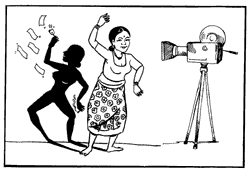 Isn't it a journalist's job to write freely? If he opens the curtains on the dark and seamier side of the cinema world, is it right to blame the messenger. This question has risen because of the demise of Shrisha Karki. If we are prosecuting junior civil servants who have become overnight millionaires, then isn't it fair to ask how cinema artistes who are supposed to earn not more than Rs 20,000 for playing in two films a year have come to pay Rs 30,000 a month in rent, have mobile phones, ride around in Santros and wear expensive clothes?
Isn't it a journalist's job to write freely? If he opens the curtains on the dark and seamier side of the cinema world, is it right to blame the messenger. This question has risen because of the demise of Shrisha Karki. If we are prosecuting junior civil servants who have become overnight millionaires, then isn't it fair to ask how cinema artistes who are supposed to earn not more than Rs 20,000 for playing in two films a year have come to pay Rs 30,000 a month in rent, have mobile phones, ride around in Santros and wear expensive clothes? And when we try to investigate these things, instead of trying to reform themselves and thank us, the cinema artistes are baying for our blood. In fact Shrisha's father, Dal Bahadur Karki, in a two-hour conversation with us two days before her suicide had said: "They don't even pay her for her work, and don't give her respect. Rather than act in another film, we'll go hungry. Shrisha won't act in any films anymore." We have been exposing this depravity in the film industry for the past four years. And yet, when we expose the vice, they come after us.
Yes, those who question the printing of a naked picture in our conservative Hindu society may have a point. And raising that question we would consider quite natural. But what is happening here is that those with old grudges against us for past exposes are using this excuse to shut us down. And filmdom is telling us: "Beware! We may be stark naked but you can't open your eyes. We'll pull your tongues out, we'll take out your eyes, and we'll file a murder case against you."
Six days after the news came out, Shrisha committed suicide like the 1,200 Nepalis who cannot come to terms with their anguish and take their own lives every year. There was no suicide note, the family has said it was suicide and allowed the body to be removed, the police report says suicide. A suicide is a suicide, it can't be murder. Even veteran lawyers have said that. And yet the angry mob of film artistes have said it was trick photography, that it was incorrect news, that it was yellow journalism, and they have registered a case of manslaughter.
Already, the person who took the picture has admitted from London to having taken it. Another film actress has admitted that she was acting as the pimp, and it has now been proven that another actress went of her own free will for the sake of monetary payment to the house of someone who had no links with the world of cinema. The lynch mob is not going to let me speak. And I am forced to ask: is reporting the truth henceforth going to be called yellow journalism?
As far as the naked picture is concerned, how come someone can go against all norms and values to take the picture, and those whose job it is to print cannot print the photo? There were five photographs and we printed the one that was the least explicit and objectionable. So we are following our journalistic guidelines. We are not the first newspaper to print naked pictures, Kantipur Publications' Nari magazine has a similar naked picture on page 26. The big boys can do anything, and when we do investigative journalism we get pounced upon.
If anyone can find my involvement in the printing of the picture in that edition, you can hang me. I have already received physical and mental punishment for that publication, and I am willing to subject myself to any other punitive action from the Press Council or the Journalists' Federation. Unlike some members of the film industry, I am not a middleman for any other profession. Therefore I have nothing to be afraid of. I am willing to accept that I have some degree of culpability for what happened, and I would like to end with the words of Yubaraj Lama of the Film Producers' Association and Harihar Sharma of the Cultural Corporation who said at Shrisha's 13th day memoraial: "Let our artiste friends look in the mirror every morning and do some self-analysis."


